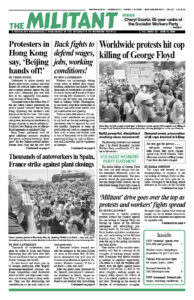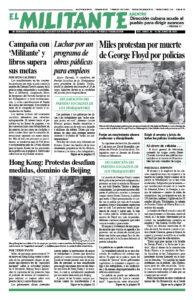YAKIMA, Wash. — Fruit packing plant workers continue their weekslong strikes for higher wages and safer working conditions at Columbia Reach Pack here and at Matson Fruit in Selah, Washington.
Strikers at Matson returned to work after the bosses said they would sign a preliminary agreement they reached with the workers’ committee at the plant. But the company reneged and a number of workers walked back out and resumed the strike. Columbia Reach bosses have so far refused to meet with the committee chosen by strikers there.
Allan Brothers packing, where the first of a half dozen walkouts in the region took place May 7, finally signed a preliminary agreement recognizing the workers’ committee and made some concessions on working conditions. Strikers are returning to work June 1, while they continue to negotiate over wages.
“I am very happy because employees will go back to work with their heads held high and with a lot of pride,” committee member Agustín López told the Yakima Herald-Republic.
These committees, which were nominated and elected on the picket lines, didn’t exist in any packing plant in the Yakima fruit growing region until the walkouts began a month ago.
The farmworkers’ union, Familias Unidas por la Justicia, is working with the committees from each packinghouse and helping to plan solidarity actions.
Familias Unidas also represents workers at Sakuma Brothers Farms, a berry-picking operation in Skagit Valley.
The organization was formed in 2013 when berry pickers walked off the job. It became a union as workers fought a number of strikes and other actions. They won recognition and a contract after a four-year struggle. Since then farmworkers in other parts of the state have reached for its help in standing up to orchard and berry farm bosses.
In the midst of the packinghouse strikes, Washington Gov. Jay Inslee announced new coronavirus guidelines for farmworkers May 28.
Some striking fruit packers work in the fields in the summer, where pay is higher.
Familias Unidas President Ramón Torres answered him on the union’s Facebook page. “There were 6 strikes here in the last 3 weeks and not one representative of the governor came to meet with us. Nor a representative of the Department of Health.”
The crowded and unsafe conditions bosses set up to maximize profits in the fruit packing plants in Washington and Oregon have contributed to significant outbreaks of the disease among workers, one of the things that spurred the walkouts in the Yakima area.
“We have fought for collective bargaining agreements. We are defending our people,” Torres said. “We put our people first, not money, not profits.”
Torres also addressed Inslee’s rules for segregating and housing H-2A workers, who are brought from Mexico and elsewhere on short-term contracts.
The new rules specify that H-2A workers be kept together in groups of 15, both on and off work, separated from other workers. “Like groups of prisoners,” said Torres.
“This also separates workers into areas where it’s going to be hard if something happens to complain, to organize themselves, to make things better,” said Rosalinda Guillen, executive director of the Community to Community Foundation, who works closely with Familias Unidas.

